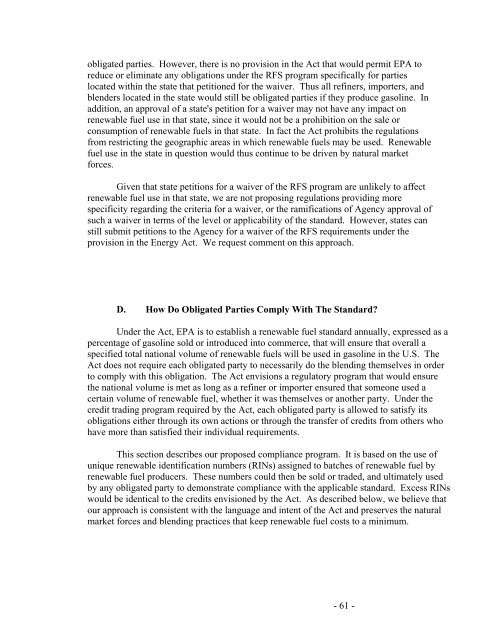Regulation of Fuels and Fuel Additives: Renewable Fuel Standard ...
Regulation of Fuels and Fuel Additives: Renewable Fuel Standard ...
Regulation of Fuels and Fuel Additives: Renewable Fuel Standard ...
You also want an ePaper? Increase the reach of your titles
YUMPU automatically turns print PDFs into web optimized ePapers that Google loves.
obligated parties. However, there is no provision in the Act that would permit EPA to<br />
reduce or eliminate any obligations under the RFS program specifically for parties<br />
located within the state that petitioned for the waiver. Thus all refiners, importers, <strong>and</strong><br />
blenders located in the state would still be obligated parties if they produce gasoline. In<br />
addition, an approval <strong>of</strong> a state's petition for a waiver may not have any impact on<br />
renewable fuel use in that state, since it would not be a prohibition on the sale or<br />
consumption <strong>of</strong> renewable fuels in that state. In fact the Act prohibits the regulations<br />
from restricting the geographic areas in which renewable fuels may be used. <strong>Renewable</strong><br />
fuel use in the state in question would thus continue to be driven by natural market<br />
forces.<br />
Given that state petitions for a waiver <strong>of</strong> the RFS program are unlikely to affect<br />
renewable fuel use in that state, we are not proposing regulations providing more<br />
specificity regarding the criteria for a waiver, or the ramifications <strong>of</strong> Agency approval <strong>of</strong><br />
such a waiver in terms <strong>of</strong> the level or applicability <strong>of</strong> the st<strong>and</strong>ard. However, states can<br />
still submit petitions to the Agency for a waiver <strong>of</strong> the RFS requirements under the<br />
provision in the Energy Act. We request comment on this approach.<br />
D. How Do Obligated Parties Comply With The St<strong>and</strong>ard?<br />
Under the Act, EPA is to establish a renewable fuel st<strong>and</strong>ard annually, expressed as a<br />
percentage <strong>of</strong> gasoline sold or introduced into commerce, that will ensure that overall a<br />
specified total national volume <strong>of</strong> renewable fuels will be used in gasoline in the U.S. The<br />
Act does not require each obligated party to necessarily do the blending themselves in order<br />
to comply with this obligation. The Act envisions a regulatory program that would ensure<br />
the national volume is met as long as a refiner or importer ensured that someone used a<br />
certain volume <strong>of</strong> renewable fuel, whether it was themselves or another party. Under the<br />
credit trading program required by the Act, each obligated party is allowed to satisfy its<br />
obligations either through its own actions or through the transfer <strong>of</strong> credits from others who<br />
have more than satisfied their individual requirements.<br />
This section describes our proposed compliance program. It is based on the use <strong>of</strong><br />
unique renewable identification numbers (RINs) assigned to batches <strong>of</strong> renewable fuel by<br />
renewable fuel producers. These numbers could then be sold or traded, <strong>and</strong> ultimately used<br />
by any obligated party to demonstrate compliance with the applicable st<strong>and</strong>ard. Excess RINs<br />
would be identical to the credits envisioned by the Act. As described below, we believe that<br />
our approach is consistent with the language <strong>and</strong> intent <strong>of</strong> the Act <strong>and</strong> preserves the natural<br />
market forces <strong>and</strong> blending practices that keep renewable fuel costs to a minimum.<br />
- 61 -
















